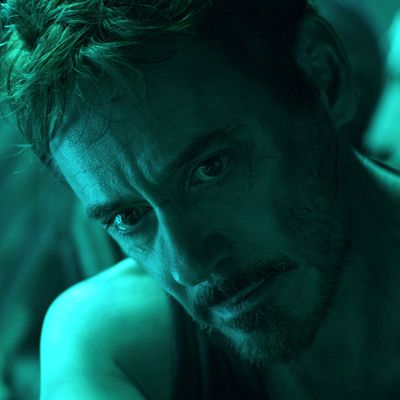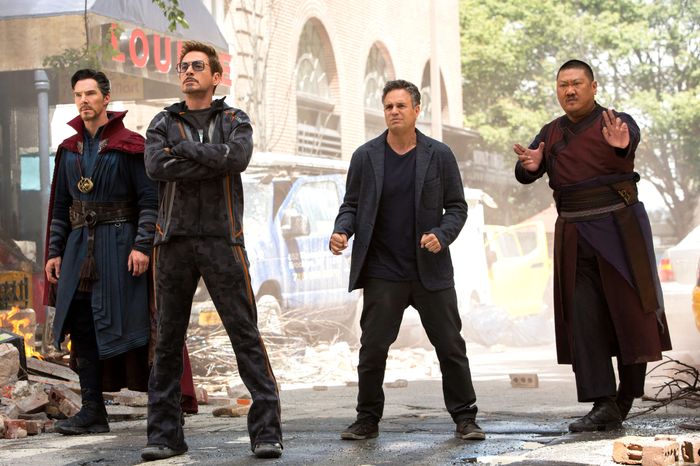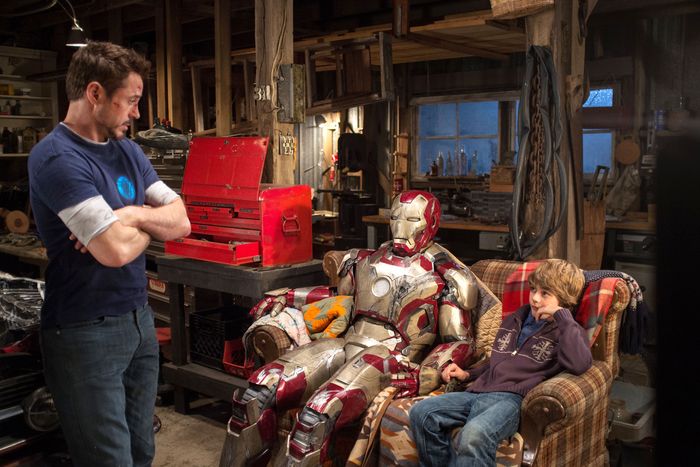
Spoilers for Avengers: Endgame below.
The Marvel Cinematic Universe has succeeded by playing moneyball. Over and over again, Marvel Studios identified performers with raw talent but little existing bankability, and snatched them up. At the beginning, the company paid them a pittance in comparison to the marquee names of Hollywood, freeing up cash that could be spent on expensive toys in other dimensions of filmmaking. Think about it: Chris Pratt was a soft-around-the-midsection TV comedy guy when he was selected to play Peter Quill; Chris Hemsworth had no notable roles in the United States prior to becoming Thor; Chris Evans even had the stink of a failed superhero franchise on him before he wielded Captain America’s shield. All of these decisions, however, were based on a successful prototype: Robert Downey Jr.
When he was cast as Iron Man, alias Tony Stark, in 2006, Downey was emerging from dire straits. Years of addiction and self-destructive behaviors had turned his career into a shell of what it had been in the 1980s and ’90s. He’d snagged a role here and there in the aughts (Kiss Kiss Bang Bang, Fur, Zodiac), but nothing landed with blockbuster reverberations. As he entered into his early 40s, the idea that he could be an action star was hardly at the top of the average moviegoer’s mind. Then Marvel’s nascent, long-shot endeavor to make its own movies — helmed largely by Kevin Feige, David Maisel, Ike Perlmutter, and Jon Favreau — turned its eyes to Downey. Eyebrows were raised (“Downey isn’t tall or rugged or bankable, but neither was Tobey Maguire when Marvel cast him as Spider-Man,” EW wrote), but the team was insistent. As Feige put it at the time, “We looked at everybody, and we found the best person for the role. It’s as confident a casting move as we’ve ever done. The proof will be in the pudding, but he is Tony Stark.”
A year before the film hit theaters, Downey seemed to know in his bones that the the franchise was about to change him — and he was about to change the franchise. “Iron Man is kind of a definitive — something so possibly two-dimensional and vapid and pointless in the bigger scope of life — but it points to a dividing line between me being identified as one thing which I’ll always be and me being identified as another thing which I’ll always be,” he told Esquire in 2007. “Someone who came out here to fuckin’ make movies and I didn’t wanna be a busboy anymore.”
Sure enough, his 2008 Iron Man performance was met with shocked raves by critics and fans alike. “At the end of the day it’s Robert Downey Jr. who powers the lift-off separating this from most other superhero movies,” Roger Ebert wrote of the film. “You hire an actor for his strengths, and Downey […] is strong because he is smart, quick and funny, and because we sense his public persona masks deep private wounds.” Within a few years, he was the highest-paid star in Hollywood (a result of some strategic contractual clauses on his part). His face became iconic around the globe.
What’s fascinating, of course, is that Downey’s own story parallels that of the character he has played for 11 years, one that he wrapped up in this year’s Avengers: Endgame. Indeed, the story of the world’s love affair with Tony Stark — and of the whole Marvel Cinematic Universe — is, in no small part, the story of the world falling in love with Downey and rooting for him to succeed. It’s not unreasonable to wonder whether the MCU can once again reach such dizzying heights now that he’s no longer one of its denizens.
For whatever reason, we humans are prone to loving redemption stories. Perhaps it stems from our own neurotic regrets about being broken and insufficient, perhaps it’s an evolutionary trait we’ve developed to prevent ourselves from killing everyone who breaks the rules. Whatever the reason, we veer toward tales, be they fictional or non-, in which someone who has been laid low and despised once again rises. Whether it’s King David lustfully ordering the death of Uriah the Hittite and later seeking forgiveness from God, or Ray Lewis morphing from NFL villain to one of its most beloved idols, we respond when a broken sinner atones and seeks a new life.
That is the story of Tony Stark, as any devoted MCU viewer can tell you. When we meet him in Iron Man, he is the most insufferable prick on planet Earth, delighting in hawking weapons of mass destruction and bragging about wealth, sexual prowess, genius, and literally any other trait he may have. The characters around him — Pepper Potts, Happy Hogan, James Rhodes — barely tolerate his presence and perpetually question whether he’s worth the effort they put into remaining close to him. Then, something miraculous happens. After he’s taken hostage in Afghanistan and nearly dies from injuries sustained in a rocket-propelled grenade attack, he realizes that he needs to think about people other than himself. Sure, it’s not the most original character arc, but there’s a reason ones like it have been deployed so often in fiction: Anyone, be they oil barons of Saudi Arabia or throat-singers of Mongolia or cooped-up teens of New Jersey, can see it and find something to grab onto.
The crowds who flooded the box office to see Iron Man and the subsequent films in which Tony made an appearance were keenly tuned in to this universality, and the trajectory only continued as the MCU went on. With each passing installment, we saw Tony gain deeper and deeper understanding of the need to listen, be part of a team, and strengthen the muscles of his empathy. He had many hubristic slipups along the way, from secretly devising a worldwide surveillance and security system in Avengers: Age of Ultron to siding with the government in its attempt to regulate superheroism in Captain America: Civil War. Indeed, even in Endgame, we see him initially reject the advances of Cap and the gang when they ask him to be a team player at the film’s outset.
But by the end of this latest, era-ending chapter, he not only steps up to the plate, he makes the most selfless decision a living creature can make, which is to offer up his life in exchange for the survival of others. When Thanos growls, “I am inevitable,” and Tony responds by echoing his famed line from his first appearance — “I am Iron Man” — he’s not just identifying himself with pride; he’s describing to himself what Iron Man has come to mean for him. It means being more than an egoist and constantly pursuing a better self, however rocky the path may be.
That, too, is what Downey has done. His road to redemption began long before his casting as Tony, and like all stories of climbing out of the abyss of self-loathing and self-harm, it wasn’t a linear one. There were setbacks and bumps in the road, moments of doubt and episodes of painful reckoning. But he was able to channel all of that into his character, and the results were movie magic. In fact, he hardly ever seemed like he was acting. Watch this viral video of him presenting a functioning bionic arm to a kid in 2015 and tell me, really tell me, whether he’s being Robert or Tony. We watched an arrogant asshole melt and reshape himself as a kinder and more giving man and knew we were seeing something more than fictional text. We were seeing the sacred human potential for change.
And now, we stand on the verge of a new and uncertain era. Even as recently as 2016, Forbes suggested that Downey’s casting in the third Spider-Man franchise was “something of an insurance policy” for the new films. Though we see in the first trailer for Spider-Man: Far From Home that Tony’s legacy lives on, we learn that he, himself, is gone from our midst. And so, too, is Downey. He will have other roles (Sherlock Holmes 3 is set for 2021), of course, but we won’t be able to enjoy him in the particular way we’ve gotten used to in the past decade-plus. The Captain America of the sweetly anxious Chris Evans — who also now appears to be off the board, albeit by way of a happy ending where he, by contrast, learned how to be just a smidge selfish for his own good — was a close second, but Tony was always the emotional core of the slick, stylish, and humane MCU.
Back in 2012, Feige suggested that Iron Man could go the way of James Bond, a perpetually rebootable character played by a varying bracket of actors. The Avengers have been known to pass a mantle or two, but who is equipped to guide us through the texts and metatexts of this ultrafranchise now? As much as we may adore Hemsworth, Pratt, Tom Holland, Brie Larson, and the rest of the crew, they lack the larger story that drew the world’s people so close to Downey. It’s genuinely unclear whether anyone can carry the torch in quite the same way. As Pepper points out in Tony’s first film and his last, Iron Man was proof that Tony stark has a heart. We have yet to see firm proof that the MCU still has one.



